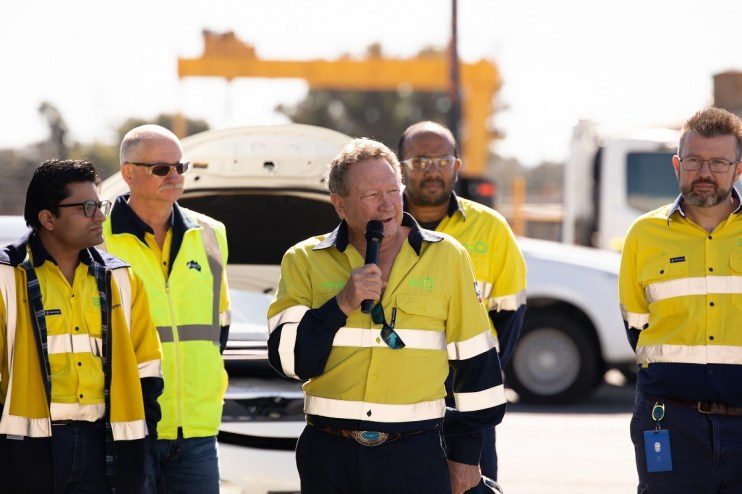Green investor Andrew Forrest threatens to quit UK after Sunak pledges new oil and gas

A major green technology investor has threatened to take his money out of the UK, after Rishi Sunak announced fresh oil and gas licensing.
The PM also confirmed approval for two new carbon capture and storage (CCS) clusters and a fiscal review on the sector’s tax regime, in a bid to woo the North Sea industry.
Andrew Forrest, the founder and former chief executive of iron ore mining giant Fortescue Metals, accused the government of “denying global warming” and being on a “clickbait cycle.”
The Australian billionaire told Politico he could not “invest in a country which is basically denying global warming and putting its faith in a failed ‘wait for the next idiot to come along’ solution called CCS.”
Forrest is currently chair of the mining giant’s renewables arm, Fortescue Future Industries, with the company investing in battery production in the UK.
The company recently announced an expansion of operations at a facility in Oxfordshire run by WAE Technologies, which the Aussie miner bought last year.
“I’m investing hundreds of millions of pounds in Britain to build up your technology and to build up your expertise. That’s at the cutting edge of battery technology, battery intelligence, everything the world needs which will make Britain relevant,” he said.
In a separate interview with Bloomberg, Forrest said: “If I see this country steering itself over a cliff backing fossil fuel, I’m going to start pulling out.
“I’ll push my investments over to North America. I’ll of course say the same thing to other countries. I must invest where I know I have proper leadership, not leadership which is on a clickbait cycle.”
Sunak still committed to net zero
Carbon capture and storage involves containing carbon emissions from fossil fuel production or high-intensity industry production and then storing it underground, normally in rock formations under the seabed.
The government is targeting 20-30 metric tonnes of carbon capture per year by the end of the decade, and considers the process fundamental to its net zero ambitions.
Earlier this year, Downing Street earmarked £20bn of funding to support new projects, shortlisting eight for approval before confirming approval for two CCS projects in Northeast Scotland and the Humber yesterday.
This includes Viking, a CCS project overseen by Harbour and backed by BP, and the Acorn development which will be operated by Storegga with support from Harbour, Shell and NSMP.
Its announced further 100 oil and gas licences are on top of the upcoming allocations from the current licensing round being overseen by the North Sea Transition Authority (NSTA) – with the government including exploration in its energy security strategy.
Sunak defended the government’s plans, which he believed would strengthen the UK’s energy security and make the countty less dependent on carbon intensive supplies from abroad.
He argued this would not jeopardise the country’s net zero goals and pointed to data from the latest Climate Change Committee report, which forecasts that a quarter of the country’s energy needs will still come from oil and gas in 2050 when the government targets net zero carbon emissions.
The report also warned the government is not on track to reach net zero and that the need for oil and gas did not in itself justify further domestic exploration.
Speaking in Aberdeenshire yesterday, Sunak said: “What is important is that we get that oil and gas in the best possible way and that means getting it from here at home – better for our energy security, better for jobs but also better for the climate because if we’re going to need it, it’s far better to have it here at home rather than from halfway round the world.”
He told reporters that approving new licenses “entirely consistent with our plan to get to net zero” because “shipping it from halfway around the world” uses “two, three, four times” the emissions than sourcing oil and gas domestically.
Research unveiled yesterday by the NSTA shows that domestically produced gas is on average almost four times cleaner than importing gas in the form of liquefied natural gas.
This is because of both the way the gas is transferred and, in some cases, the methods of extraction.
“Of course I am committed to net zero,” Sunak said. “But I’m also committed to our energy security and we will get to net zero in a proportionate and pragmatic way that doesn’t unnecessarily burden families with costs or hassle that they don’t really need in their lives.”
The government has been approached for comment.